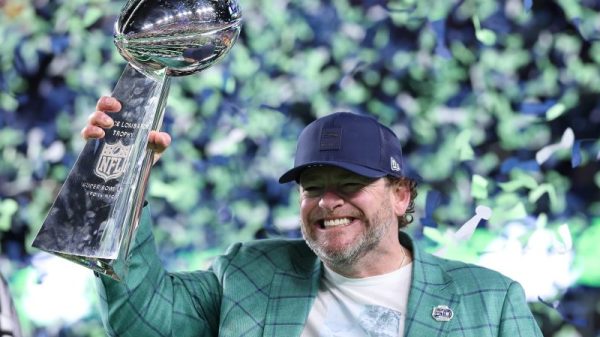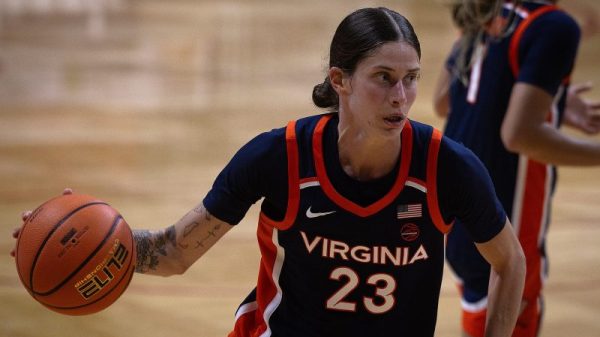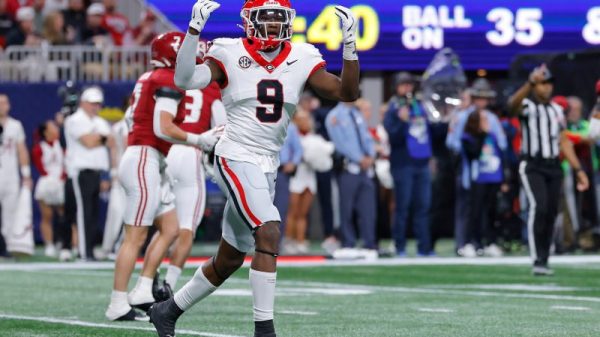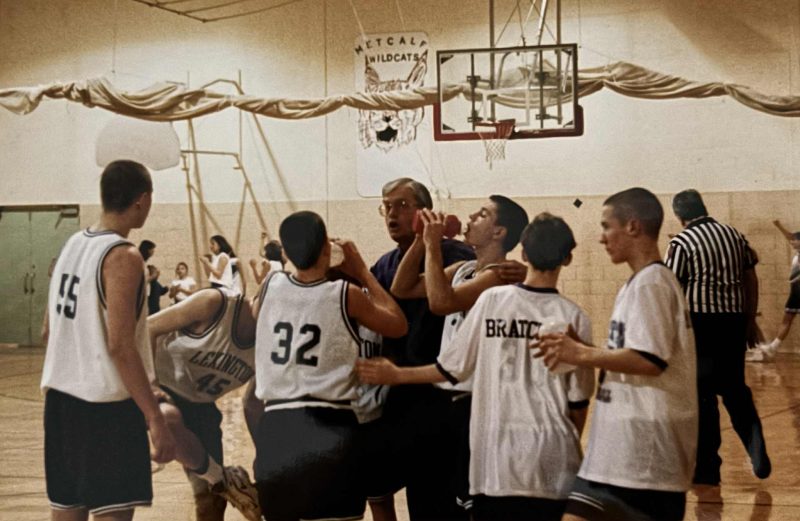Ron Roher had already spent nearly two decades as a junior high math teacher and coach in Lexington, Illinois, when he first met Lance Benedict. At the time, Roher was coaching his son Scott’s Little League team, and Lance, just a year younger, was on the roster.
Even then, Lance stood out. He had a big left-handed swing and serious speed. But it wasn’t until years later that Roher felt compelled to step more deeply into Lance’s life.
By junior high, Lance was a restless kid, always moving, always up for something. In a small town like Lexington, which has hovered around 2,000 residents for decades and could be mistaken for thousands of others like it across the country, there was always something to do.
“Want to head down to the Mackinaw River and go swimming, Lance?”
“Sure thing, guys.”
“Want to ride bikes down to The Filling Station?”
“I’m in.”
And then, as he got a little older, came the offers that could derail a future.
“Want to grab some beer, Lance?”
“Want to smoke a little weed?”
You get the picture.
“I was kind of friends with everyone,” Lance said. “I guess, growing up next to the trailer court, I ran around with the rough kids. I didn’t even know they were rough at the time.”
Roher knew Lance’s dad was only around sporadically, and that his mom was doing her best to keep up, running a small flower business and raising a family. Now Lance was in eighth grade, and Roher was his coach in baseball, basketball and track. He saw Lance slipping, and he felt responsible. So, he did what he always did. He acted.
One day during lunch hour, Roher pulled Lance into the school library and sat him down in the computer lab.
Roher rarely raised his voice for anything, and he didn’t today. Still, he was stern.
Roher started by telling Lance he believed in him. It wasn’t something the boy was used to hearing from an adult. It embarrassed him at first.
“I still remember dropping my head and staring at those cowboy boots he always wore,” Lance said. “Just staring at them.”
Then Roher asked him to look him in the eye. He told him he was making choices that would lead to trouble. He reminded him of his athletic gifts, his potential and the future he could have if he wanted it.
Roher ended by saying if Lance ever needed anything – anything at all – he was here for him.
“When someone goes out of their way to tell you that,” Lance said. “He didn’t have to do that. He cared enough to do that. And I respected him enough to listen because I knew he was right.”
At first, Lance slowly started leaving the bad influences behind. He excelled in high school on and off the field, earning homecoming king honors his senior year. He played four years of college baseball. Then, he became a firefighter in nearby Bloomington.
Next year, he’ll retire as captain.
“I probably would’ve made some horrible decisions,” Lance said. “I always tell Scott, your dad changed the direction of my life with that one conversation.”
Seasons that begin in August and end in June
Today, if you find yourself driving down Old Route 66 and turning onto Main Street in Lexington, you might end up at Kemp’s Upper Tap – a modern gathering spot with a rotating craft beer list and a menu that reflects the times. Strike up a conversation with the owner, Jon Kemp, and you’ll learn he studied math and played basketball under Roher back in 1996.
Looking for something quieter? Head to the Lexington Public Library, where Sherrie Dodson-Patton oversees the shelves and recommends novels. Long before she took on that role, she was a math student of Roher’s in 1967.
Need to talk water issues? Stop by the Public Works Office and ask for Billy DuBois, the Water Superintendent. He learned math, played baseball and ran track for Roher in 1987. And if your concern goes beyond water, City Hall is just down the street – where Mayor Spencer Johanson, a 1972 Roher student and basketball player, might be in his office.
In Lexington, it’s hard to walk into any building without meeting someone who was taught or coached by Roher. The high school. The auto body shop. The grocery store. Even among the farmers working the fields. If you went to school in Lexington during the ’60s, ’70s, ’80s, or ’90s, odds are Roher taught you math. And if you were a boy, he probably coached you, too.
I knew Ron Roher well. For 37 years, he taught math and coached at Lexington Junior High. I was one of the hundreds of boys he coached, and one of the thousands of students who sat in his classroom.
So when he retired in 2002, it felt strange that his departure was marked only by a short mention in the local paper. No ceremony. No headlines. And when he passed away in January 2021, there was only an obituary.
But maybe that wasn’t strange at all. Junior high coaches rarely get recognition. There’s no record book for the winningest junior high coach in America. No awards. No fanfare. Just seasons that begin in August and end in June.
That was Roher’s rhythm. Every August, before classes even started, he was out on the baseball field adjusting batting stances and hitting ground balls. After coaching basketball all winter, he’d finish the year with track practices in May or June, sometimes after school already had ended, preparing for the junior high boys state meet.
Ten straight months of coaching. Year after year after year.
“Lexington is certainly a different place because of Ron than it would’ve been without him,” said Dan Freed, a life-long Lexington resident who played three sports for Roher in 1978-79 and is now a longtime MLB scout with the Las Vegas Athletics.
“Let me say that differently. Lexington is a great small town because of its people. Mr. Roher was one of those people – but he also had an influence on many others. He helped shape Lexington.”
If you’re from a small town, you probably know a Ron Roher. His story is rooted in Lexington, but it echoes across the country, in places where men and women devote their lives to teaching and coaching below the high school level. Not for glory. For growth.
Their legacies aren’t written in headlines. They’re written in the lives they’ve shaped.
In all the Lance Benedicts.
Putting Lanesville on the map
Roher’s story begins in tiny Lanesville, a cluster of a couple of dozen houses tucked among the corn and bean fields of central Illinois. To find school, sports, and a sense of community, he had to travel to nearby Illiopolis – a modest town that felt like a metropolis by comparison. It was there, on the playground and gym floor, that he first dreamed of becoming the next Bob Cousy, the dazzling ball-handler of the Boston Celtics dynasty.
Roher was a talented multi-sport athlete, but by the time he graduated high school, he knew the NBA wasn’t in his future. When he arrived at Illinois State University in the fall of 1962, coaching already had captured his imagination. He admired Ray Meyer, the legendary DePaul coach, but was increasingly drawn to a rising figure at UCLA, John Wooden, who had just led the Bruins to the NCAA Final Four.
Roher didn’t just look up to Wooden; he began to emulate him. He adopted Wooden’s deliberate style, favoring calm instruction over fiery speeches. He even embraced Wooden’s famous ritual of teaching players how to properly put on their shoes and socks, a small but telling detail that spoke volumes about preparation and care.
“I remember thinking, ‘Really?’ when he did that,” said Ed Moore, who played for Roher in 1969-70, and later played AAA for the Chicago Cubs and then returned to Lexington to coach. “‘He’s showing us how to put on our socks?’
“But it set a tone. He was going to take his time and show us how to do things right.”
At ISU, Roher studied education and discovered he had a natural gift for it. As a student teacher in math, he was endlessly patient, explaining concepts again and again until they clicked. He wasn’t just teaching equations; he was building confidence, showing kids that they were capable of more than they believed.
When he graduated in 1966, nearby Lexington had an opening for a junior high math teacher and basketball coach. It was a perfect fit. He and his high school sweetheart, Mary, whom he had married in 1963, packed up their car and made the short drive to their new home.
Getting them ready for high school
Roher worked at the school year-round, teaching math during the academic year and working as a janitor and handyman in the summers, scrubbing floors and repairing classrooms.
He liked the area. The countryside was filled with farm families, and those kids brought a special kind of grittiness to their games.
The town itself reminded him of Illiopolis, with tree-lined streets, a handful of restaurants, a grocery store, post office, library, grain elevator, gas station, and, as residents liked to joke (mainly because it was true), three bars and five churches. Some families, like the Paynes, Freeds and Browns, had lived there for generations. It also had many recent move-ins, mostly folks who worked in nearby Bloomington but preferred the smaller Lexington schools.
As he started coaching – just basketball at first, before adding baseball and boys track a couple years later – he realized the assignment was quite different from what he’d imagined. There wasn’t much pressure to win. Lexington lived and died with its high school varsity teams. Cars parked in the end zone days before jam-packed home football games to claim the best seat in the house, honking after big plays. In the winter, you’d better get to the tiny gym early for a varsity basketball game, or you wouldn’t get a seat.
For the junior high teams, though, winning was secondary. The boys who reported to Roher were the town’s future, raw talent and untapped potential. They needed to be nurtured, given a solid base and taught the fundamentals, so they’d be ready for greatness when the high school coaches took over.
That philosophy intrigued Roher. Of course, he wanted to win – “Why else do they keep score?” he’d joke – but his deeper motivation was instruction. He found joy in the process — teaching key skills, building character and watching young athletes grow.
By 1970, Roher’s basketball teams had already reached the state tournament three times. That year, he coached Moore and Lexington finished fourth in the state. Moore still remembers the sting of a lucky half-court shot from the opponent that ended the third quarter of the third-place game. “We weren’t happy,” Moore said with disgust. Some competitors carry a grudge for decades.
Roher wasn’t one of them. Still, he was disappointed. He knew he’d done his job well; these kids were ready for high school. However, three trips to the state tournament had whetted his appetite.
“He wanted to win the big one, the state title,” Moore said. “It was never going to make or break him. But it was one of his goals – to hold the big trophy.”
‘Don’t tell me, show me’
At that point, the Roher family had grown. Christine was born in 1968, and three years later, her brother Scott arrived. With two small children, Ron and Mary embraced life in Lexington, drawn to the close-knit community where most high school seniors had started their educational journey together in kindergarten. They bought a house and, as with many families with sports in their DNA, mounted a basketball hoop above the garage.
From an early age, Scott was his father’s shadow. He followed Ron to ballfields and gymnasiums, not just to watch but to learn. Roher didn’t give lectures. He gave his experiences. Scott helped line the cinder track in spring, sat on the bench with his dad in winter and measured the baseball diamond in fall, digging holes for base anchors. Amid the dirt and chalk, he absorbed lessons in responsibility, pride in a job well done and even geometry. “We measured 90 feet to first base and third base,” Scott said. “And then used a² + b² = c² to make sure we had it right.”
No job was beneath Roher. Junior high coaches rarely had help, and calling the workload “challenging” would be generous. But he embraced it all, teaching, coaching, sweeping floors after practice. He didn’t complain, and he didn’t cut corners.
Winter brought a familiar challenge — the battle for gym time. With high school teams dominating the schedule, Roher’s junior high squads often practiced before school, meaning he saw the same boys in class later in the day. It was a grind, but it taught him one of his most enduring lessons – the importance of separating athletics from academics. No matter what happened on the court, whether a player soared or stumbled, Roher left it behind when he stepped into his eighth-grade math classroom. There, they’d get the same calm, focused teacher. It was a discipline he demanded of himself, and it helped him earn his students’ trust.
Chris Hawkins, who played all three sports for Roher during the 1982–83 school year and is now a teacher and baseball coach himself, remembers that dynamic vividly. “I was a cocky kid, and I wasn’t doing well in math because I wasn’t trying hard,” he said. “He took me aside and we talked for probably half an hour. He read me the riot act. I tried to charm my way out of it, but he saw right through me.”
Roher’s message was simple and relentless: “Don’t tell me, show me.” Hawkins heard it at least twenty times during that conversation. The tough love worked. Hawkins improved in math, and he never felt that classroom frustrations spilled onto the court.
“I wouldn’t remember him as a great coach if that was the case,” Hawkins said. “And I remember him as a great coach.”
Roher earned that reputation. He attended basketball coaching clinics nearly every year, meeting legends and returning with fresh ideas. One year, he crossed paths with Bobby Knight, the acclaimed coach of the 1976 (and later 1981 and 1987) national champion Indiana Hoosiers, and didn’t hesitate to pull him aside.
“It was crazy,” said Tom Laxton, a 4th-grade teacher and 7th-grade basketball coach who was one of Roher’s closest friends. “We’re in the gym, and over in the corner, there was an 8th-grade basketball coach chewing the ear off one of the greatest college coaches in the country.
“I found out later they were deep in conversation about man-to-man defense. Ron wanted to know everything.”
Inspired, Roher committed to the defensive strategy full-time and stuck with it until the end of his career.
He very briefly tried on Knight’s fiery persona, too.
Scott remembers one postseason game when he was about 6 years old. The team was struggling, trailing at halftime. Ron had a plan — let the boys stew in the locker room, then burst in with a “Bobby Knight routine’ to jolt them awake.
“If he was mad, I was mad,” Scott said. “So, I was planning on being right there scowling, too.”
But the gym had swinging saloon-style doors. As Ron charged through them, they flung back and caught Scott squarely, sending him flying. The locker room erupted in laughter. Ron, who hardly ever lost his cool for real, dropped the angry coach act. The tension was broken, and a relaxed Lexington team returned to the court and staged a comeback win.
“He eventually learned that the best plan was to just be himself,” Scott said.
That moment stuck with Roher. He realized that authenticity, not theatrics, was his strength. His players didn’t need a show.
Roher’s 1977 squad delivered his deepest postseason run yet, advancing all the way to the state title game. There, they faced a formidable Lincoln Carroll Catholic team that was led by Dan Duff, who later played at Notre Dame.
“He was so big,” said Mick Freed, Dan’s brother and one of that team’s stars who later played in the minor leagues with the St. Louis Cardinals. “I don’t think he got any bigger after that, either. He was fully grown by eighth grade.”
Despite the challenge, Lexington battled to the end, falling by just four points. It was another near miss, but a growing sense of confidence tempered the disappointment.
“He was among the best junior high coaches in the state,” said Mick Freed.
Lexington was his home
By the early 1980s, Roher had become more than just a respected coach in central Illinois; he was one of Lexington’s most popular teachers as well.
Outside the classroom, Roher carried an intense self-competitiveness. He wasn’t trying to beat others; he was trying to beat yesterday’s version of himself.
“We’d go golfing, and he’d want to be better than he was the last time we were out,” said Laxton. “But he was never competitive with me, really. He could be hard on himself, but he was always helpful if somebody else needed it.”
That mindset carried into the classroom, where Roher was known for his patience and his willingness to help any student who asked, no matter how long it took. He often arrived early or stayed late, working one-on-one with kids who needed extra support.
Roher had a soft spot for underdogs. One day, while teaching number patterns – “1, 3, 6, 10… what comes next?” – a student who struggled in most subjects began identifying the sequence faster than anyone else. Roher lit up. He praised the boy like a star pupil and continued celebrating his success for months. It wasn’t just about math. It was about showing the class that intelligence comes in many forms, that you should never underestimate anyone. That moment became a cornerstone of Roher’s coaching philosophy.
“He coached everyone the same,” said Michael Keagle, who played for Roher in 1992 and went to state in basketball. “It was almost annoying at times. But if we had drills going on, he’d spend as much time working with the 10th-best player on the team as he would with the starters.”
Just as he did with basketball, Roher pushed himself to keep learning. In 1986, he returned to Illinois State University to take a few extra math classes, earning a certification that allowed him to get a pay raise.
He was sometimes obsessive with it. He’d take up a new subject, and for a time, he’d devote huge swarths of time and energy. He and Laxton took an adult education class in photography, and Roher threw himself into the craft with intensity, eventually building a darkroom in his basement. He often could be found around town, camera in hand, capturing squirrels in the park or snapping shots of the historic log cabin near the public pool. He had an eye for detail and a love for the town. “Lexington was his home,” said Laxton, “and he was proud of it.”
As much as anything, though, Laxton says Roher liked to laugh. If you didn’t know him well, he might seem serious. But players, students, and friends saw a different side – a dry, biting wit that could catch you off guard. After one baseball game in 1987, he was praising his lumbering catcher, Bill Brown, when he quipped: “It was a great game for Brown, who had three hits and did a great job stretching that triple into a double in the fourth inning.” It was classic Roher, funny, pointed, and delivered with a straight face.
“He was so funny,” Laxton said. “You had to be on your toes because his mind was so sharp.”
But the truth is, there wasn’t much time for Roher away from work.
His daughter Christine remembers him as a loving father, but says his coaching schedule meant he was almost always at school.
“He was coaching ten months a year,” she said. “I don’t really remember us hanging out that much or going on family vacations. You can’t do that when you’re needed by your team.”
Christine says she’s proud of how her father helped shape lives in Lexington – but sometimes wishes she had gotten to know him in that same way.
“The last time we were back in town, people came up and told me how much he had meant to them. They shared stories about things he’d said or done. How much he had mattered.
“That stuff is great. It’s important. But I was a little jealous.”
Her brother Scott saw more of their father through sports. During the 1986-87 school year, Roher had the pleasure of coaching him. It was a year Scott remembers fondly. That fall, Roher’s baseball team made a deep run, reaching the sectional final, just one win short of the state tournament.
Lexington repeated the feat the following year, losing a heartbreaker 3-2. Roher didn’t sleep well that night, replaying the game in his head, wondering if there was anything he could have done differently. The next morning, he arrived at school bleary-eyed. When the players from the team came in later that day for their eighth-grade math lesson, Roher had a simple message.
“Great season,” he said. “I’m proud of you. Get your uniforms washed and turned in by the end of the week.”
Twelve hours of brooding had been enough. He paused, then added with a familiar edge of resolve:
“Basketball practice starts Monday.”
For 37 years, a love of coaching
By the late 1980s, Roher was beginning to feel the weight of time. The long seasons, the travel, the endless practices – they were starting to take a toll. He stepped away from junior high baseball, trading the dusty diamond for the quiet greens of high school golf. It was a gentler sport, but even that couldn’t shield him from a wake-up call — a minor heart attack in 1989.
Though he delayed surgery until 1994, the experience forced Roher to reconsider the pace of his life, and the sports he could continue coaching, and he finally gave up both golf and track. However, he held on to eighth-grade basketball, where he continued to have success. In 1992, he led a team to the state tournament. He did it again in 1996.
Roher believed the 1998 team had a real shot at winning it all. As seventh graders, they’d gone undefeated until an overtime loss to Stewart-Strasburg in the state tournament. The next year, Roher brought them back. And waiting in the semifinals? The rematch with Stewart-Strasburg.
“That game was on our minds all year,” said Chris Coffey, a standout on that team who went on to play four years of varsity basketball and is now a high school coach himself.
Lexington got its revenge, 52–50. The championship game didn’t go their way. Hanna City Logan – a powerhouse led by a pair of tall, identical twins – beat Lexington by nine. Another second-place finish. But this one felt different. This one almost felt like a win.
“Yeah, Roher was disappointed,” said Dan Freed, who coached the seventh-grade team that winter and assisted with the eighth graders.
“But that team was so talented and so coachable, he said it might’ve been the most fun he’d ever had coaching.”
So when Roher announced his retirement from basketball just weeks later, it caught people off guard.
“I think he wanted to go out on a high note,” Dan Freed said.
And he did.
Roher left behind a coaching legacy that’s hard to match. He led eight basketball teams to the state tournament, finishing second twice. He was named the Illinois Coaches Association Coach of the Year in both 1977 and 1998. He sent dozens of athletes to the boys state track meet.
“If he’d had that kind of record as a high school coach, he’d be considered a legend,” Coffey said.
In baseball, five of Roher’s former junior high players went on to play in the minor leagues. Many others played in college. A good number became coaches themselves.
In 2021, Roher was honored with The Lexington Education Advancement Foundation’s Patriot Award, which recognizes individuals who have contributed to the excellence of the school district over the years.
It was an incredible honor, given that he had never coached a single high school game.
‘Better people because you were our coach’
Ten years ago, I was invited back to Lexington for the 25th reunion of the 1990 varsity baseball team – the high school’s only state championship squad. That group included the same players who had made back-to-back sectional title-game runs with Roher in junior high.
Billy DuBois organized the event. Scott couldn’t make it, but Roher was there, wearing his signature cowboy boots and proudly reminding anyone who’d listen that he was the first to tell Coach Ed Moore this group had the potential to be special.
The room buzzed with laughter and old stories. The smell of barbecue mixed with the sound of ’80s rock, and every so often someone would slip next door to Kemp’s Upper Tap to grab a few beers. Jon Kemp was waiting.
Coach Moore spoke, as did a few of the team’s stars. I was asked to say a few words, and I did – proudly declaring that in 1990 I was “the best damned bullpen catcher in the state of Illinois.” It was a joke, of course. But it was also true.
Someone shared a story about how Ron and Mary Roher had grabbed our dirty uniforms between games at state and rushed off to a local laundromat to get them washed. We looked fresh every time we took the field that weekend in Springfield.
It was a great event, and near the end, I found myself standing with my friend Lance Benedict – the same player Roher had helped with tough love all those years ago.
Our old junior high coach walked over.
As he always did, Roher told us how proud he was of us and of that team. He mentioned again how he’d been the first person to predict greatness for his son’s senior season team. He was so pleased that he’d had a part in it.
Then he paused and shook his head slightly.
“You were state champions,” he said. “That was the one thing I never accomplished.”
Lance didn’t hesitate.
“That doesn’t matter,” he said. “I probably wouldn’t be where I am without you. Probably none of us would.
“We’re better people because you were our coach.”
Roher left that night with a smile on his face.



























